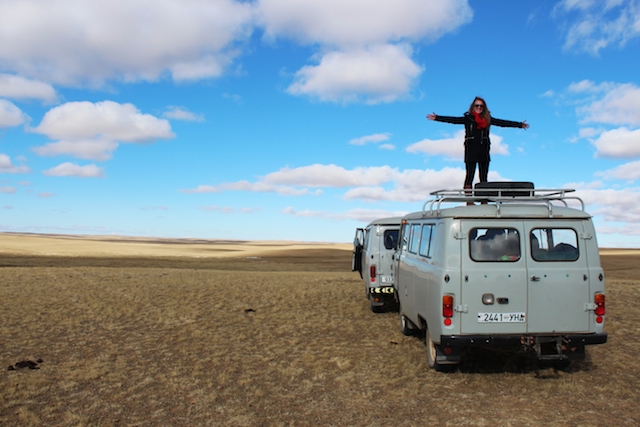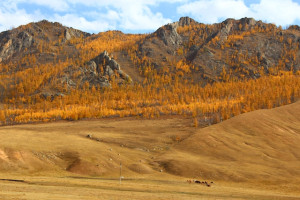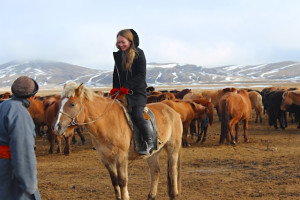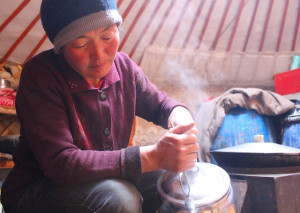Reflections On Life From The Mongolian Steppes

There is simply nowhere and nothing quite like driving a jeep straight across the sprawling Mongolian steppes without a single road in sight, our driver winding down the window to wave to the local herders, flagging them down to ask for directions in raspy Mongolian: “Is Ulaanbaatar through this valley or the next?”
“Just follow the sun” appears to be the route indicated by a man sitting on top of a black horse, gesturing between the only landmarks around: the mountains, a river, and the sun. With easily a hundred sheep surrounding him, his livelihood dutifully follows him back across the endless grassy plains as our jeep revs back into gear, bound for the capital.
In almost any other country on Earth, you have to escape in pursuit of nature. In Mongolia, the challenge is to escape from nature. As the least densely populated country on Earth, you can drive for a week and spot nothing more than a few white dots on the horizon – the gers of nomadic families and their animals. The blue skies seem bigger than anywhere else on Earth, the mountains and land sprawling across sheer expanses of space, a place a city slicker like me could have never imagined.
Still another day shy of our final destination, we drive towards a distant ger and inched our way through hundreds of horses, sheep, cows, and dogs as we approached a man and woman peering over the livestock to see who is coming. Visitors from the capital is the answer; two Mongolians and a few foreigners, bearing gifts of imported chocolate and fruit in exchange for a place to sleep.
They welcome us into their home, a round room smaller than the average American sitting room, built from white fabric, a few wooden poles, and carpet on the walls for warmth. Considering the family will move several times each year to bring their animals to better land and water, they stick to the essentials: four wooden beds, a stove, a small table, a few stools, pots, pans, several large vats for fermenting horse milk, and a Buddhist shrine.
We are fed flour noodles and boiled meat in a light soup with horse milk, and fermented vodka is ladled out in a single wooden bowl after the meal. We take turns sipping and wincing as the warm liquor goes down. It is November, a rare month for visitors to be exploring a country where temperatures plummet below 20 degrees. Once the vodka has worked its way into our veins, we are rolled into bed with all of our layers on and wrapped in camel fur blankets to protect us from the penetrating chill of the Mongolian night.
As the first rays of the morning sun sprinkle through the top of the ger, we awake shivering to a small fire left for us in the metal stove. Our host has already gone to move his flocks far across the plains, but his wife stays behind to feed the horses. She welcomes us to go for a ride, and we spend a few hours trotting through the exquisite morning air. The entire livelihood of this family comes from these animals: they use the meat and bone marrow for soup, the milk for drinking and making butter, the hides and bones become blankets and tools, and even the horses’ hair is strung as decoration inside the ger.
As I take it all in, I am confronted with a stark and terrifying realization: I am a clumsy and fragile urban being who exists at the mercy of modern civilization and millions of other people who create the things I need to live. To my hosts, life is survival. A day’s journey from the nearest city and supermarket, they don’t trudge to the grocery store after work to buy vegetables for dinner or order Chinese take-out after a long day. They have learned a lifestyle of utter self-sufficiency, whereas I would starve to death within days out in the blistering Mongolian cold. I have grown up with everything I have ever needed within a 10-minute walk or drive from my home. Since my survival is a given, my life is spent trying to find meaningful things to fill my time. Their day is spent trying to make it to the next.

Mongolia has awoken me to a divergent reality and shown me how human beings have lived for thousands of years…and how some still do. Thanks to the steppes and the nomadic families who welcomed me into their homes and fed me around their fires, my understanding of the spectrum of societies all over the world will never be the same.
Guest Author: A former New York City management consultant turned legal nomad, Elaina Giolando writes about the intersection of career, life, and travel for today’s twenty-somethings. She currently works as an international media representative, traveling to a new country every 3 months to live and work. In her spare time, she focuses on providing her peers inspiration to proactively create rewarding and unconventional lifestyles. Her blog can be found at onevoiceinthebigcity.tumblr.com and you can follow her on Twitter @OneVoiceBlog.




One Response
What a journey! I heard a lot about Mongolia and I’d love to see it with my own eyes one day, before it gets to busy with tourists though.